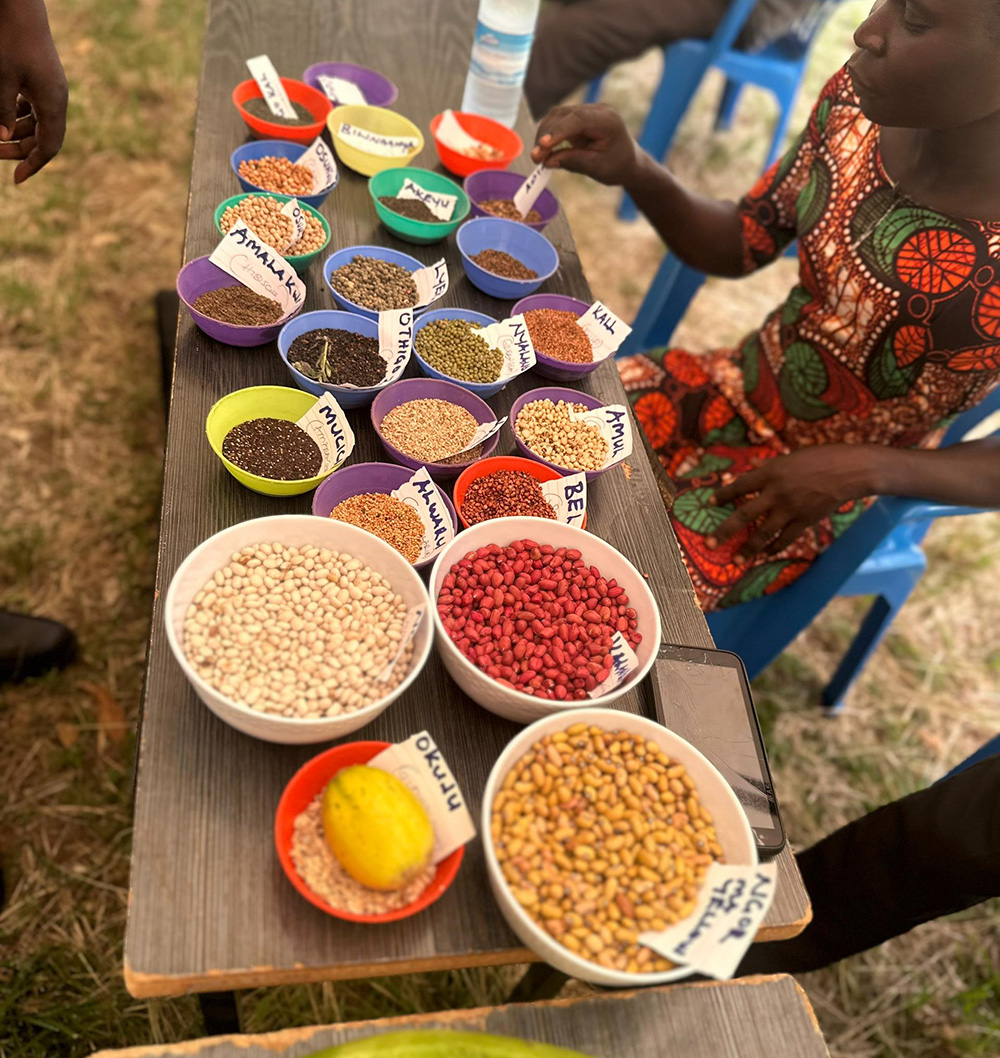West Nile centre to equip farmers with indigenous seed information, climate change coping mechanisms
According to Erick Kizito, the manager of the Agro Ecology and Sustainable Natural Resources Management Department from Participatory Ecological Land Use Management (PELUM) Uganda, 90% of smallholder farmers rely on informal seed systems that are usually saved and sometimes sold or shared among the communities.
The Mayor of Nebbi District, Geoffrey Ngiriker, explaining the importance of some trees species at the launch of the centre. (Credit: PELUM Uganda)
____________________
While seed is a prerequisite for any agricultural activity, access to diverse and locally adopted seed in Uganda is being threatened by commercialisation, coupled with the increasing impacts of climate change.
According to Erick Kizito, the manager of the Agro Ecology and Sustainable Natural Resources Management Department from Participatory Ecological Land Use Management (PELUM) Uganda, 90% of smallholder farmers rely on informal seed systems that are usually saved and sometimes sold or shared among the communities.
This is because processed commercial seed distributed by seed companies is presumed to be costly for farmers.
Indigenous seed on display during the launch of the centre. (Credit: PELUM Uganda)
For example, a kilo of maize from a seed company is usually between shillings 6,000 to shillings 10,000, depending on the seasons, while a kilo of farmer-saved maize seed costs shillings 3,000, which smallholder farmers prefer due to the lower cost but the fact that farmers will be getting the seed from someone they know.
However, for farmers to ably benefit from locally adopted seed in Uganda, there is a need for timely and readily available information on the different indigenous knowledge to respond to farmers' needs whenever the need arises.
Such is the reason why PELUM, in close partnership with its member organisations such as AFCE, with support from SSNC, HUMANDI and NORAD, established the Mic Pa Mungu, an agroecology resources information centre during the GreenActionWeek25. The event held in Nebbi districts from September 7-13, 2025, under the theme Sharing Community. The centre aimed to make it easy for farmers to get the needed information.
According to Sekasi Ojwingi, a programs officer at Mic Pa Mungu PELUM centre in Nebbi district, explained that the role of the centre is to promote natural ecosystems where living organisms interact with each other and benefit from each other and preserve nature for sustainable livelihood.
Once embraced, the farm will transform the mindset of targeted beneficiaries and communities in preparation for the devastating effects of climate change, such as drought, which, when it arises, destroys all food crops, especially those planted using less resilient seeds.
Ojwingi added that droughts and flooding are some of the effects of climate change that the centre will be addressing through the introduction of different methods and practices that will keep farmers in production.
“Crops and animals need a balanced amount of water and sunshine. In the farm, we have tanks that preserve water to be used in the dry season, and water control measures such as digging up contours in the gardens, digging trenches, in addition to planting napier grass on top to control the speed of the running water, which also saves water for the plants in the dry season, among others,” he said.

Making use of plastic bottles for irrigation. (Credit: PELUM Uganda)
He added that the choice of the location was based on the fact that the farm is on a steep slope; therefore, there was a need to create a solution to make it possible for farmers to produce crops at the same time raising livestock using the different technologies that can be learnt at the centre.
Ojwingi also added that environmental protection conservation practices that trainees will be exposed to include briquette making, which is a type of energy source produced from branches of trees, food peels, among other food waste, instead of using the whole tree to make charcoal for cooking.
“From promoting organic farming using plant-based residues to make pesticides and fertilisers, to promoting technologies that prevent soil erosion, the use of IMO in piggery to keep the environment clean as well as the health of the pigs, the centre is also teaching farmers how to raise tree seedlings using a greenhouse for the promotion of agroforestry purposes,” he said.
In addition to drought-tolerant crop varieties, farmers coming to the centre are expected to be exposed to indigenous seed suitable for their area and also drought-tolerant varieties like okra, eggplant, which farmers can access, which will in the long run, save them the costs incurred while purchasing hybrid seed.
During the climax event of the Green Action Week held on September 12, Kizito said the above activities, including the launch of the agroecology centre, were part of celebrations to mark the Green Action Week.
In Uganda, the day was marked in Nebbi district between September 3-7, 2025. Kizito said the Green Action Week is a global campaign that happens in 50 countries across, to celebrate sustainable consumption. These years’ activities were marked under the theme A Sharing Community as the Global theme.
It aims to share about the different resilient food Systems, seeds and agricultural practices that can help farmers use the indigenous knowledge and seed in the current environment.
According to Kizito, the one-week campaign was aimed at promoting the cultural and ecological practice of farmer-to-farmer seed sharing.
“Through festivals, cultural exhibitions, school activities, and media engagement, the campaign raises awareness of the value of diverse, indigenous seeds and strengthens local seed networks,” Kizito said.
He added that by igniting local knowledge exchange and intergenerational collaboration, the campaign supports sustainable food systems, enhances seed access, and fosters a stronger sense of community resilience.